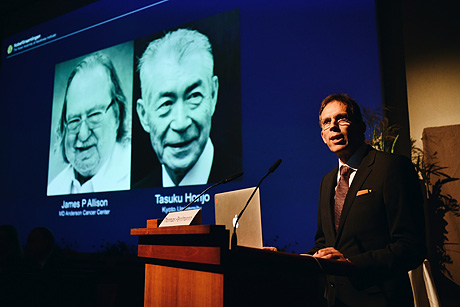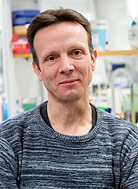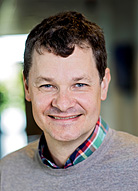 The Nobel Foundation’s Thomas Perlmann announces this year’s Nobel Laureates in Physiology or Medicine. PHOTO: Erik Cronberg.
The Nobel Foundation’s Thomas Perlmann announces this year’s Nobel Laureates in Physiology or Medicine. PHOTO: Erik Cronberg.
Great, well-deserved, a victory for basic research – which has led to magical clinical results. These are comments from researchers at Sahlgrenska Academy, University of Gothenburg, after the 2018 Nobel Prize in Physiology or Medicine was announced.
The prize goes to James P. Allison, University of Texas, and Tasuku Honjo, Kyoto University, for their discovery of cancer treatment by inhibiting the immune system’s suppressor mechanisms. The Laureates have established a completely new principle for cancer treatment that involves strengthening the immune system’s inherent ability to attack tumor cells.
“Great and well-deserved,” says Max Levin, associate professor, commenting on the Nobel Prize. He is an oncologist and treats patients with metastatic malignant melanoma, an aggressive cancer with a very poor prognosis historically. Most patients have died within a year or two after diagnosis.
Radical changes in results
 “The situation has radically changed in recent years with the introduction of immunotherapy,” Max Levin declares. “Almost daily I see magic clinical results among patients treated with immunotherapy. We see how some patients become tumor-free and maybe even cured. An amazing development in which this year’s Nobel Laureates were two of several important pioneers. A future challenge is to increase the proportion of patients who respond to immunotherapy. At present, far from all do.”
“The situation has radically changed in recent years with the introduction of immunotherapy,” Max Levin declares. “Almost daily I see magic clinical results among patients treated with immunotherapy. We see how some patients become tumor-free and maybe even cured. An amazing development in which this year’s Nobel Laureates were two of several important pioneers. A future challenge is to increase the proportion of patients who respond to immunotherapy. At present, far from all do.”
Jonas Nilsson, professor of experimental cancer surgery and director of the Sahlgrenska Cancer Center, emphasizes that the Nobel Prize shows the importance of basic research if we are going to make great strides in the treatment of complex diseases such as cancer.
Allison and Honjo are immunologists who studied how T cells are deactivated and also found a way to activate them. Through experiments with mice, they were able to show that cancer cells rely on so called checkpoint proteins to inactivate T cells. Other researchers, such as Gordon Freeman and Arlene Sharpe, also played an important role in understanding the significance of these proteins.
New trial in the wake of the discovery
 “In our ongoing research, we are using as a starting point the research of Allison and Honjo and the clinical results that Max is talking about. There are still patients who need treatment after immunotherapy has stopped working or if it does not work at all in that particular patient. In these cases we want to research new combination treatments using immunotherapy as a base,” Jonas Nilsson says.
“In our ongoing research, we are using as a starting point the research of Allison and Honjo and the clinical results that Max is talking about. There are still patients who need treatment after immunotherapy has stopped working or if it does not work at all in that particular patient. In these cases we want to research new combination treatments using immunotherapy as a base,” Jonas Nilsson says.
“We have already started a unique clinical trial at Sahlgrenska Hospital for patients with ocular melanoma, which normally does not respond to immunotherapy. Lars Ny and Henrik Jespersen are attempting in their trial to determine if what we have seen in the lab—that recognition of a tumor through epigenetic therapy can be enhanced—will be able to help patients. We could not have initiated any of this without the research that led to this year’s Nobel Prize.”
More about the prize
Contact: Jonas Nilsson and Max Levin
Photos: Portraits of Jonas Nilsson (photo: Johan Wingborg) and Max Levin (photo: Elin Lindström Claessen)

 “The situation has radically changed in recent years with the introduction of immunotherapy,” Max Levin declares. “Almost daily I see magic clinical results among patients treated with immunotherapy. We see how some patients become tumor-free and maybe even cured. An amazing development in which this year’s Nobel Laureates were two of several important pioneers. A future challenge is to increase the proportion of patients who respond to immunotherapy. At present, far from all do.”
“The situation has radically changed in recent years with the introduction of immunotherapy,” Max Levin declares. “Almost daily I see magic clinical results among patients treated with immunotherapy. We see how some patients become tumor-free and maybe even cured. An amazing development in which this year’s Nobel Laureates were two of several important pioneers. A future challenge is to increase the proportion of patients who respond to immunotherapy. At present, far from all do.” “In our ongoing research, we are using as a starting point the research of Allison and Honjo and the clinical results that Max is talking about. There are still patients who need treatment after immunotherapy has stopped working or if it does not work at all in that particular patient. In these cases we want to research new combination treatments using immunotherapy as a base,” Jonas Nilsson says.
“In our ongoing research, we are using as a starting point the research of Allison and Honjo and the clinical results that Max is talking about. There are still patients who need treatment after immunotherapy has stopped working or if it does not work at all in that particular patient. In these cases we want to research new combination treatments using immunotherapy as a base,” Jonas Nilsson says.